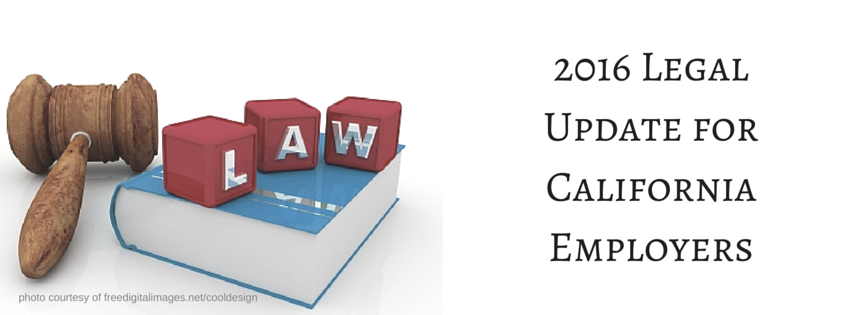I attended a seminar last week discussing the most recent legislation that went into effect on January 1, 2016 (yes the seminar is held a bit late to discuss, but better late than never). I was aware of much of this legislation, but there were a few new things that I hadn’t heard about either. In the event this information is new to you, I’m sharing it in this blog today. There are a few things that apply to very limited employers, so I have not listed them in this blog.
SB 358 Expands protections under CA law against gender-based wage inequality. California has abandoned the phrase “equal work” from prior law and changed it to say”substantially similar work” meaning the tasks don’t necessarily have to be the same. You can pay differently due to factors such as a seniority system, merit system, quality of production, or other factors other than gender. Records of wages, rates, terms of employment, and job classifications must be maintained for 3 years.
AB 622: Places limits on when CA employers may use e-verify. You may not use the federal e-verify system to check the employability of a current employee, or a person who has not received an offer of employment, except when required by federal law or as a condition of receiving federal funds. Each violation can be fined up to $10,000.
AB 2053: Raises the minimum wage to $10.00 per hour (hopefully you were already aware of this requirement and currently pay all employees at least this amount. Cities have the right to set their hourly minimums, so make sure employees are paid correctly based on their location of employment. Please also note that the wage of exempt from overtime employees is also affected due to this increase. The salary test for an exempt professional, executive, or administrative employee is twice the minimum wage which is $3467 per month. Highly paid computer software professionals must be paid $7265.43 per month to be exempt from overtime, and licensed physicians or surgeons must be paid $76.24 per hour to be exempt from overtime.
SB 588: The Labor Commissioner may place a lien on an employer’s property when there is a judgment against them for unpaid wage and hour violations, penalties, or interest.
AB 970: Allows the Labor Commissioner to issue citations to recover funds from employers who fail to make proper expense reimbursement payments to employees.
SB 579: Expands both the reasons and who can take job-protected school leave. An employer of 25 or more employees in a location must allow up to 40 hours off per year to allow a parent (including step-parent, foster parent, guardian, or another individual acting as a child’s parent) to engage in events related to the child’s placement, enrollment, or activities at a school or licensed daycare center.
AB 987 protects persons requesting religious or disability accommodation. Whether or not the request is granted, a person requesting reasonable accommodation is protected from retaliation or discrimination. It is recommended that unless the request would create a safety issue, that requests be granted.
AB 1513: New piece-rate and pay stub rules: Every piece rate plan must be in writing and clearly explain how the plan works, result in compensation that is not less than the minimum wage, and provide pay for all rest breaks/recovery periods/and all non-productive time. The employee’s wage statement (pay stub) must show the hours, rates of pay, and gross wage earnings for all compensable breaks, recovery periods, and other non-productive time.
If you have questions regarding the details of this legislation (I was trying to abbreviate the details to limit the length of this post) search online by the law’s number to get all the information. It’s important to follow all the laws properly to prevent employee suits against your business.
